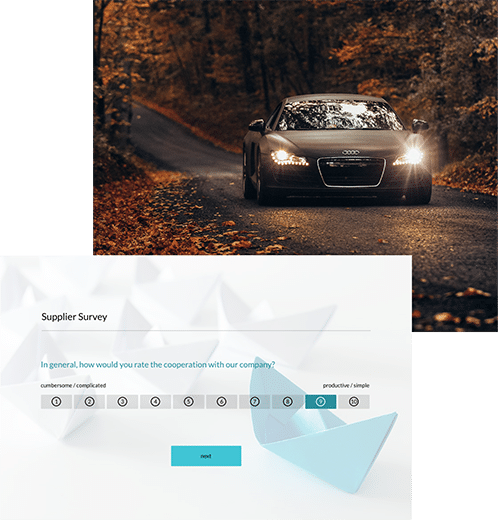
Shape tomorrow's future today with online questionnaires







The digital transformation is changing our lives in many areas: Increased urbanization, changes in purchasing and consumer behavior, and changes in society as a whole are also confronting companies in the logistics and mobility sectors with completely new challenges and requirements.
Like other companies, you too can withstand the change and the increasing challenges with data from easyfeedback surveys.
Challenges of the automotive & logistics industry
1. Digitalization, networking and automation
End customers of all kinds nowadays consider it normal to be able to buy goods and products directly online, and in some cases have them delivered the same day. In critical business sectors, such as aerospace and automotive, intraday, fast and reliable delivery of spare parts and production-critical parts is essential to ensure the reliability of production, maintenance and more.
The increasing digitalization, automation, networking and integration of systems to increase the efficiency and effectiveness of production and logistics chains are, in part, consequences of this enormous change in purchasing behavior.
On the other hand, it is often a balancing act for companies in logistics chains to find the optimal degree between supply capacities, price calculations and customer enthusiasm. The frequently asked question here is: Where do I invest in measurable improvements in the future?
2. Individualization and flexibilization
The scalability and flexible adaptation of business models, technical solutions, materials, products and services is becoming increasingly important for automotive manufacturers and the transportation and logistics industries.
With the help of new technologies and concepts, customer wishes are to be fulfilled in the future in the best possible way and quickly in terms of form, function and content – and ideally at better costs than in mass production.
The increasing speed of digital change presents both opportunities and risks. From mass production to customized products and services; from time-intensive customization to flexible, just-in-time change.
3. Innovations and new technologies
Whether modern vehicle concepts, innovative drive technologies or improved service offerings and platforms: The introduction of changed concepts and technologies into existing (work) processes and structures is one of the most difficult tasks, especially for large companies with international locations.
Although the transformation into even more productive workflows offers a great opportunity for companies, it can also entail risks in the wrong or unprepared investment.
4. Increasing customer requirements
Ordered in the morning, delivered the same day in the evening… For many areas of application, such as medical deliveries, spare parts deliveries in workshops and even more, it is common for partial deliveries to be made on the same working day. Whether it’s end customers in B2C, or same-day deliveries in B2B, the demands on the entire logistics and transportation industry are becoming ever greater and more extensive.
At the same time, however, continuing to delight customers is an additional challenge of our time: additional services in B2C, such as the assembly of a delivered washing machine including the removal of an old appliance, are changing the operational process and the underlying planning and calculations enormously.
5. Employee satisfaction and workplace stress
Due to the increased demand situation in online retailing and the resulting increase in deliveries, especially from private households, is an increasing burden for employees in the logistics sector: deliverability is not always guaranteed, increased deadline pressure, as well as dealing with customers under particularly high hygiene protection measures and more are reflected in employee turnover rates and satisfaction rates.
The question in this area could be: How can companies invest purposefully in measures to improve employee satisfaction and reduce churn or quit rates?
6. Environmental and climate protection
Dekarbonisierung, alternative Antriebstechnologien, umweltfreundliche und nachhaltige Materialien und Produkte, effizientere logistische Abläufe und Prozesse: Die politischen Vorgaben zum Schutz der Umwelt und des Klimas stellen den Automobil-, Transport- & Logistiksektor vor weiteren enormen technischen und finanziellen Herausforderungen.
Doch wir wissen alle: Für eine saubere Welt sind gerade in diesem Wirtschaftssektor neue gelebte Arbeitsabläufe, frische Innovationen und kontinuierliche Forschungsarbeit gefragt.
Range of application of questionnaires in the automotive & logistics industry
Decisions don’t have to be made intuitively or from the gut. Use surveys to look into the minds of your employees, customers and suppliers and make promising decisions based on feedback.

Promote personal and professional competencies
Determine which competencies, qualifications and seminars are needed with 360-degree feedback or the simple identification of training needs. By doing so, you can prepare your employees for the demands of future tasks and requirements through workshops, training courses and seminars and ensure the competitiveness of your company.

Prototype testing
Give product managers and the research and development department a valuable tool with online feedback forms to test products and prototypes even before market launch.
Inquire about expectations and wishes for new products in advance or determine the willingness to buy within your target group and customers in order to develop the product launch and marketing strategy as efficiently as possible to avoid potential failure.

Facilitate administrative activities
When it comes to digitalization, automation and optimization of internal work processes, online surveys from easyfeedback can be a valuable part of it.
For example, create surveys that are transformed into interactive complaint or contact forms, or invite event participants via a registration form in the shape of an online questionnaire.
Link surveys with easyfeedback to your CRM system, for example, so that new or existing contacts are automatically created and customized.

Digital supplier rating
In the automotive industry in particular, as a result of increased outsourcing, it is not only the manufacturers of motor vehicles who are involved in planning, development, production, marketing and sales, but also suppliers, dealers and more. These suppliers and service providers are also an important factor in the success of automotive manufacturers. Therefore, they should always be systematically evaluated and assessed according to certain criteria.
Online surveys can be used, for example, to query operational and qualitative criteria or (product) technical competencies and evaluate them using a scoring system.

Advantages of surveys with easyfeedback
The easyfeedback survey tool helps you to manage market-related changes, increasing expectations and requirements of customers as well as the attractiveness and duty of care as an employer with targeted surveys.
Create your own questionnaires flexibly in just a few minutes and without prior knowledge, adapt them to your corporate identity and invite your survey participants via various channels. The feedback from your participants is displayed in real time and can also be collected anonymously if required. All received answers from the survey are automatically presented to you as diagrams and tables. Use custom filters to segment results based on responses, behaviors, or even statistical values. Export the results to the format of your choice and share them with colleagues and supervisors.
Want to link our tool to other systems? No problem. easyfeedback can also work with other systems to automate processes and tasks.
- Easy questionnaire design without prior knowledge
- Work in multiple teams
- Extensive evaluation of results
- Integration of feedback into your processes
National Express Rail GmbH


Avosax GmbH


